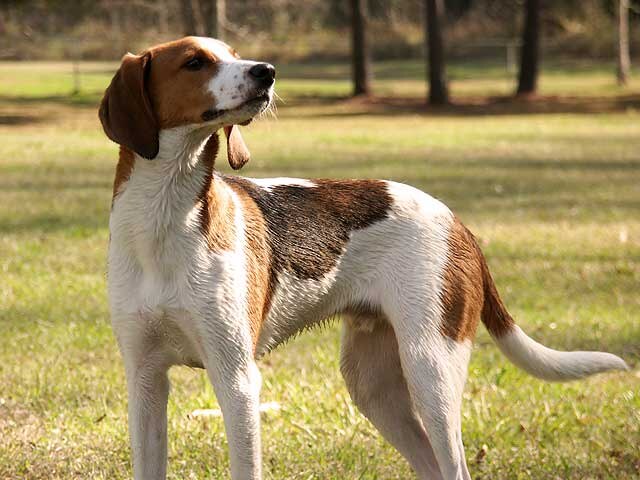


The Coonhound is a group of hounds originally bred for hunting and tracking game. Known for their incredible scenting ability, stamina, and determination, Coonhounds are often used for hunting raccoons and other small to medium-sized animals. They are versatile dogs that come in several different varieties, including the Black and Tan Coonhound, Bluetick Coonhound, Redbone Coonhound, and Treeing Walker Coonhound. These dogs are intelligent, hardworking, and loyal, making them excellent working dogs and loving family pets when properly trained and socialized.
The Coonhound breed originated in the United States in the 18th and 19th centuries, specifically bred for hunting purposes. Early American settlers wanted a dog that could track and tree raccoons and other small game. Over time, they developed various types of coonhounds by crossing different types of hounds, including English Foxhounds, Bloodhounds, and other native American breeds. The Coonhound became highly regarded for its incredible scenting ability, stamina, and ability to work independently. Each variety of Coonhound developed distinctive traits suited for different hunting needs. Today, Coonhounds are still widely used as hunting dogs, though they also make loyal and affectionate companions in the right home environment.
Coonhounds are medium to large-sized dogs with a strong, athletic build that reflects their working nature. They typically weigh between 40 to 75 pounds and stand 21 to 27 inches tall at the shoulder, depending on the specific variety. They have long, muscular legs, a deep chest, and a long, slightly curved tail that helps them maintain balance while tracking. Coonhounds have a distinct head with drooping ears and deep-set, soulful eyes that give them a characteristic appearance. Their coat is short to medium-length, dense, and typically sleek, though it may vary depending on the variety. Common coat colors include black and tan, bluetick (blue with black spots), red, or a mix of colors depending on the specific Coonhound variety. Their powerful noses and strong limbs make them excellent trackers and hunters.
Coonhounds are generally friendly, intelligent, and independent dogs. They are known for their calm and affectionate nature toward their families, though they can be a bit reserved with strangers. These dogs are incredibly loyal to their owners, forming strong bonds with them. While they are good with children, they should be supervised around smaller pets, especially if they have a strong prey drive. Coonhounds are also known for their vocalization; they have a distinctive baying or howling sound, which they use to communicate during hunting. While they are great working dogs, they also have a loving and calm demeanor when at home. However, they can be independent and stubborn, so consistent training is necessary.
Given their history as hunting dogs, Coonhounds are active and energetic, requiring plenty of exercise to stay healthy and happy. Daily walks, runs, or hikes are necessary to satisfy their physical needs. Coonhounds also enjoy outdoor activities like playing fetch and running in a fenced yard. They have excellent stamina and can cover long distances, making them well-suited for active families or individuals who enjoy outdoor adventures. However, because they are strong-willed and independent, they should be kept on a leash or in a secure, fenced area when outdoors. Mental stimulation is also important for Coonhounds, so interactive toys, scent work, or obedience training can keep them engaged and prevent boredom.
Training a Coonhound can be a rewarding but challenging experience, as they tend to be independent and sometimes stubborn. However, they are intelligent dogs who can learn quickly when motivated. Positive reinforcement methods, such as praise and treats, are most effective. Early socialization is essential to ensure that they grow up to be well-behaved and confident around people, other dogs, and animals. Socializing them with various people and environments from a young age will help prevent shyness or aggression. While Coonhounds are eager to please their owners, they have a strong prey drive and may be more focused on scenting and tracking than on following commands, so training should be consistent and patient.
Coonhounds are generally healthy dogs, but they are prone to some specific health issues, especially due to their active and working nature. Some common health concerns in Coonhounds include hip dysplasia, elbow dysplasia, and ear infections due to their long, floppy ears. Regular veterinary check-ups are important for maintaining their health, and they should be kept up-to-date on vaccinations, flea and tick prevention, and heartworm medication. Coonhounds are also prone to obesity, so a balanced diet and regular exercise are key to keeping them at a healthy weight. Their short coat requires minimal grooming, but their ears should be cleaned regularly to prevent infections, and their nails should be trimmed as needed.
The average lifespan of a Coonhound is typically between 10 to 12 years. With proper care, including regular exercise, a balanced diet, and routine veterinary visits, they can live long, healthy lives. Regular monitoring of their weight and joint health is essential, especially as they age. Some Coonhounds may develop age-related conditions such as arthritis or cataracts, so keeping an eye on their health as they mature is important. Providing them with mental stimulation and keeping them physically active will help them stay sharp and maintain a good quality of life throughout their years.
© copyright Dog Compendium 2024 - 2026